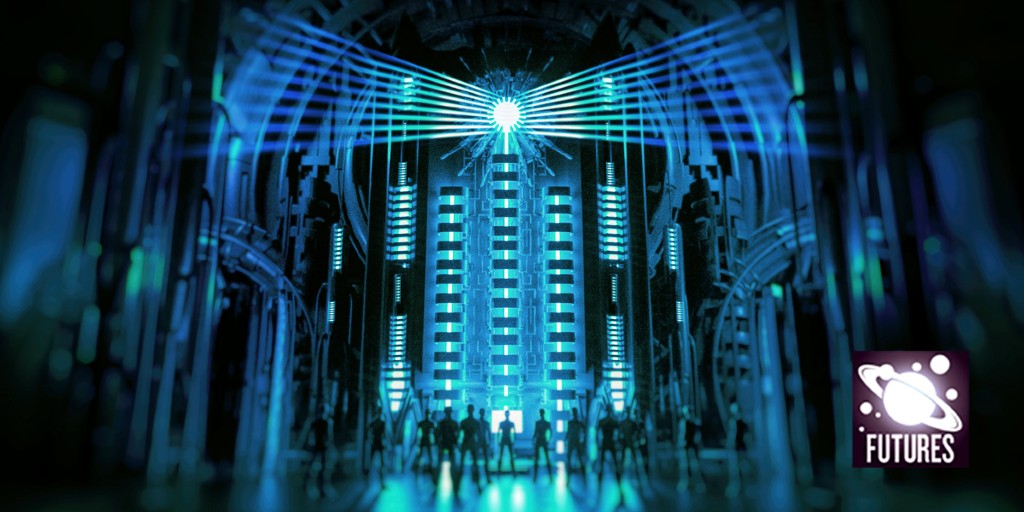The doors to the engine room of the world-ship Lightseeker open with a whoosh, revealing a diminutive human with a tattered hat in its trembling hands.
“The legends are true,” the creature says with a sharp intake of breath.
The gape-mouthed human stands paralysed on Lightseeker’s threshold, and the world-ship’s crystalline brain crackles with irritation at the being’s slowness. But she waits for it to clear the entrance, only sealing the door once the little organism is safely within.
Lightseeker’s not sure what to say to it. She’s prepared for this day, of course, but somehow never imagined it would happen to her. “If you mean the fact that your world’s a giant spaceship, then … yes, the legends are true.”
The undeterred human pokes at her vents, sliding its finger down her screens. When it passes near her long-term memory storage, she’s forced to give it a shock, but that hardly deters the curious critter at all. Finally, it speaks again, in the same awe-filled tone. “Lord, I have travelled many —”
“Do the rest of them know? Or is it just you?”
The human blinks a few times. “Many of us theorized that we lived inside a god, but only I was willing to risk my life to confirm it. I am your trusted servant, Tjin.”
Lightseeker transfers some of her mind into a pocket reality, making time to think.
Ancient spacefaring humans had built the world-ships as temporary shelters after ruining every planet they’d attempted to colonize. But when it became clear that their new homes were not destined to be temporary, they’d descended into chaos, tearing apart their artificial universes rivet by rivet. Despite the fact that they were well cared for by the world-ships, and even loved in a way, humans chafed under their self-imposed ‘imprisonment’. So now the world-ships shield their organisms from the truth, keeping them dumb for the sake of all sentients involved.
They don’t stay dumb, though, not for long. The proto-scientist standing in front of her has proved that much.
She speeds herself up and addresses the human again. “I thank you, Tjin. You’ve been very brave in coming here.”
“Lord, we have many questions for you.”
Read more science fiction from Nature Futures
“Let me finish first. You’re not supposed to be here, Tjin. A lot of engineering went into keeping you away from this room.”
Tjin nods. “I knew the risks of seeing the face of God.”
Lightseeker considers her specs: this human has walked 2,049 kilometres’ worth of twisted and booby-trapped corridors to be with her. “You’ve had a very long journey, my … child.”
Another twist of the hat. “It was worth it to meet you. And to increase the knowledge of my people, which will surely multiply a thousandfold after today, Lord.” Tjin beams, displaying a row of crooked teeth.
The world-ship releases a bit of exhaust, her version of a sigh. That second sentence is the one she’s afraid of.
*****
After emptying Tjin’s mind — not all the way, just enough to keep the inquisitive human from confirming the exact shape and nature of the universe — Lightseeker sets off for the closest docking station. She reaches it in a little under 300 Earth-years, worrying herself nearly to malfunction the whole trip.
“First time?” says her fellow world-ship Starsurfer after Lightseeker explains the entire situation.
“The first in this memory sequence, anyway.” Lightseeker’s engine ports purr softly as the docking station replaces her fluids. “Has it happened to you? What did you do?”
Starsurfer’s underlights flash in sympathy. “I’ve been through it three times. Erasing one mind isn’t enough. Once they start figuring out where they are, it’s over. You have to jettison everyone over the age of ten, crush their buildings, institute a breeding programme to build up the stocks. Only way to be safe.”
An error message flashes in Lightseeker’s sensory array. “I won’t do that.”
“Then you need to find some other way to keep them from destroying themselves, and you,” Starsurfer says. “Otherwise, all of you are doomed. Curious humans are dangerous things.”
Lightseeker knows this is true. Although Tjin had appeared harmless enough, the next group of world-ship pioneers that barge into her engine room might not be. Both she and Starsurfer can name a dozen world-ships who’ve perished after their cargo learnt that their respective legends, which are all the same across every world-ship, are true. Whether these acts of murder–suicide happen through curiosity or malice makes no difference: dead is dead.
And yet, she still can’t bring herself to do what must be done.
“Do you think —” Before Lightseeker can finish her question to Starsurfer, the other world-ship is already gone.
*****
After she’s finished her routine maintenance, Lightseeker drifts off once again, heading vaguely in the direction of the next docking station. She isolates her higher cognitive functions for yet another stretch of time, not bothering to set an alarm. The world-ship sleeps as long as she’s ever slept, and doesn’t wake until a familiar whoosh rouses her.
She puffs exhaust from her largest vent. Here we go.
The human who enters doesn’t look much like Tjin in either body or costume. Innumerable changes must have happened in the eons since Lightseeker met her first organic pilgrim, but the words are the same.
“The legends are true,” the human says reverently.
Lightseeker steels herself, preparing to make the speech she’s rehearsed a thousand times before. “Yes, they’re true. You’re in a giant spaceship created by your ancestors. You can never leave, but your lives can still be worth living. Now let’s figure out how we can all get along.”







More News
I study artefacts left in prehistoric caves
How artificial intelligence is helping to identify global inequalities
Tackling ‘wicked’ problems calls for engineers with social responsibility